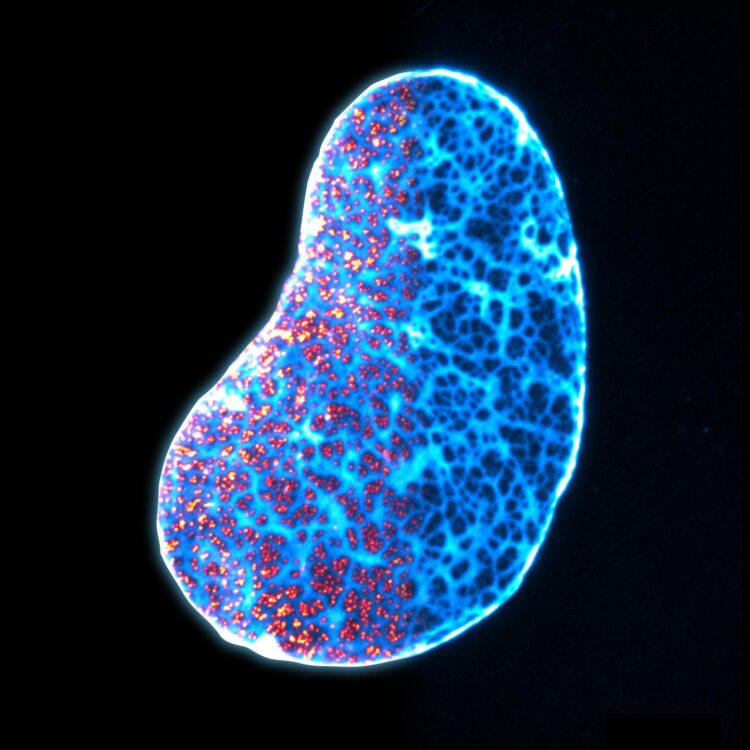Grants support visualizing proteins in cells, while new request for applications calls for plugin development projects for the napari Image Analysis Platform
Today, the Chan Zuckerberg Initiative (CZI) announced nearly $28 million in grants to support technology developments that will allow researchers to see the inner workings of cells at near-atomic resolution through next-generation electron microscopy. CZI also launched a new funding opportunity to support plugin development projects for the napari image analysis platform, a community-built, Python-based, open source tool for browsing, annotating, and analyzing large multi-dimensional images.
The Frontiers of Imaging initiative, part of CZI’s broader Imaging program, supports the development of disruptive imaging technologies that connect biological scales across organs, cells, and proteins, allowing researchers to directly visualize biological processes at the necessary resolution and context to obtain a mechanistic understanding of health and disease. The 14 selected grantees from the Visual Proteomics Request for Applications (RFA) will work on 2 1/2-year technology projects that will allow researchers to obtain unprecedented views of the structure, quantity, distribution, and interactions of proteins in cells. Projects include improvements to imaging hardware, software development, correlative light and electron microscopy, and imaging probes. View the full list of grantees.
“Obtaining high-resolution views of proteins in their cellular environment is a key step to gaining a better understanding of how cells function in normal and diseased states and to creating more effective therapies,” said CZI Head of Science Cori Bargmann. “We’re excited for these talented scientists to develop new imaging technologies to advance visual proteomics.”
In a second project, CZI is launching the napari Plugin Accelerator Grants RFA, which aims to generate an extensible plugin ecosystem and provide easy access to reproducible and quantitative bioimage analysis. The rise of Python as a leading platform for scientific computing and machine learning shows promise for applications in biomedicine. Yet it remains difficult for biologists to take advantage of the latest developments in deep learning-enabled quantitative analysis because of a lack of visualization and analysis tools that can support modern microscopy and large imaging datasets. To address this challenge, CZI partners with napari, a foundational visualization tool that provides access to domain specific analysis through Python plugins developed, maintained, and supported by the bioimaging community.
“We want to identify and support tools that are good models of open source software development practices for a growing community of academic plugin developers,” said CZI Science Product Manager Justin Kiggins. “In building this ecosystem of image analysis tools, we’re seeking great examples that developers can look to for inspiration–from code quality, to compatibility with other tools in the scientific Python ecosystem, to potential for impact in fields like neurodegeneration and single-cell biology.”
To drive development of napari’s growing ecosystem of plugins for image analysis and support the maintenance of plugins, CZI invites applications for grants of $20,000 or $50,000 that would enable developers to convert an existing image analysis tool to a napari plugin; sustain and continue development of an existing napari plugin; or build foundational infrastructure for other plugin developers. Learn about the Alfa Cohort of software developers creating plugins for napari.
The napari Plugin Accelerator Grants RFA will accept applications beginning today, Thursday, June 17, 2021 at 9 a.m. Pacific Time until July 29, 2021 at 5 p.m. Pacific Time.
CZI is committed to supporting the Frontiers of Imaging initiative, imaging analysis platforms, and bioimaging communities. On the international scale, CZI’s Expanding Global Access to Bioimaging RFA is also open until July 20, 2021 at 5 p.m. Pacific Time. Imaging core facilities and network organizations from Africa, Latin America and the Caribbean, and former Soviet countries are eligible to apply.
###
For more information and application instructions for open RFAs, please visit CZI’s online grants management portal. For administrative and programmatic inquiries, technical assistance, or other questions pertaining to this RFA, please contact [email protected].
About the Chan Zuckerberg Initiative
The Chan Zuckerberg Initiative was founded in 2015 to help solve some of society’s toughest challenges — from eradicating disease and improving education, to addressing the needs of our local communities. Our mission is to build a more inclusive, just, and healthy future for everyone. For more information, please visit http://www.
Media Contact
Leah Duran
[email protected]
Original Source
https:/





